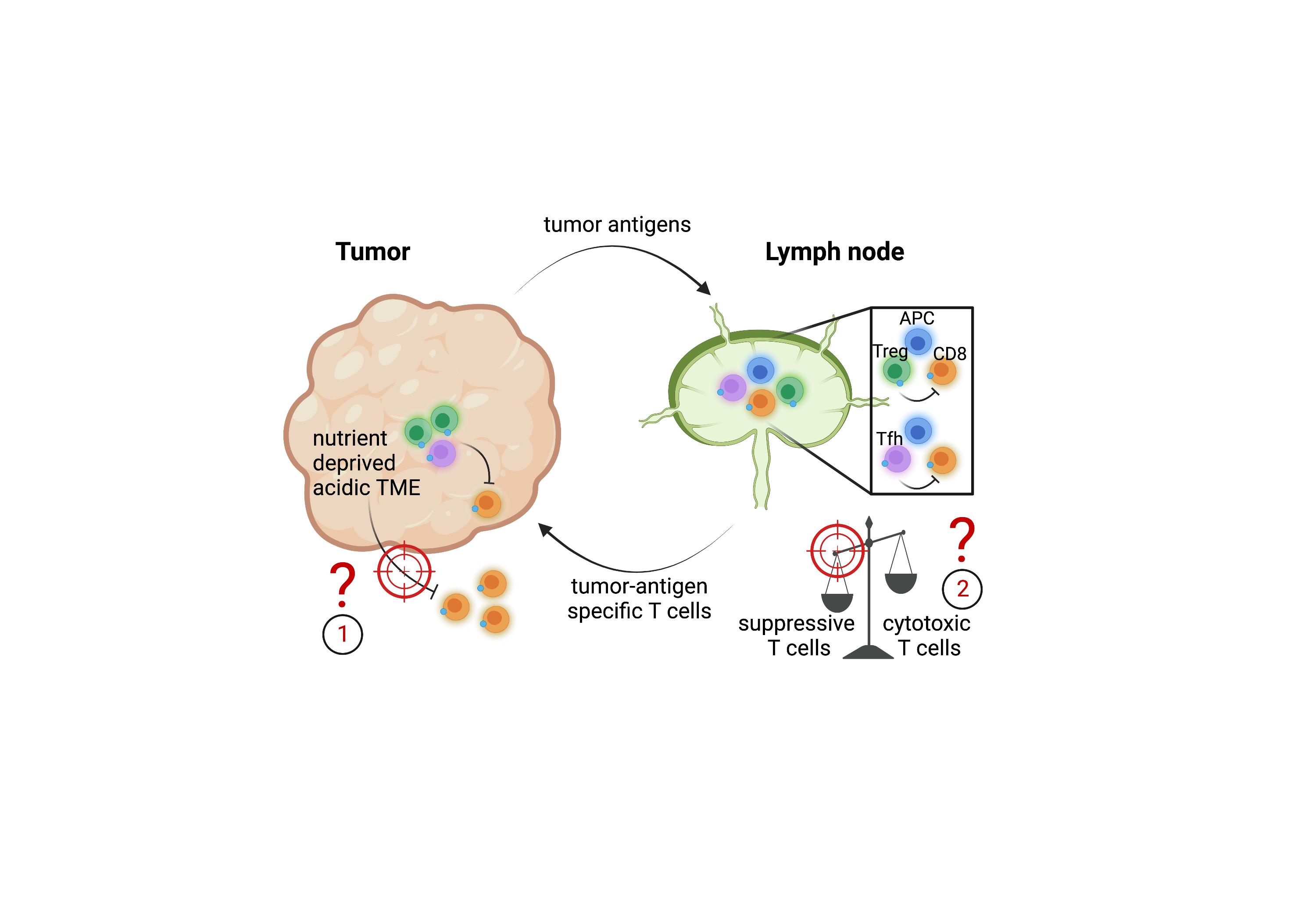
Research
Tumor development and progression require precise coordination of several fundamental biological processes, including cellular metabolism and immune tolerance. Due to their elevated energy demand for proliferation, cancer cells adapt to utilize the most efficient fuel source. Cancer cells not only exploit the nutrient pool within the tumor microenvironment (TME), but, in the process, also deplete metabolites essential for proper immune cell function. This ultimately impairs the recruitment, survival, and activity of anti-tumor cytotoxic T cells, allowing cancer cells to escape immune recognition. However, the mechanisms governing the integration of tumor metabolic rewiring and immune evasion remain unclear.
The Zappasodi lab uses genetic and pharmacologic approaches coupled with in-depth molecular and cellular profiling together with computational analyses of the TME to understand these mechanisms and how to control them for counteracting tumor growth.
Dr. Zappasodi has a longstanding interest in immunosuppressive CD4+ T cells, which are critical in tumor immune evasion and immunotherapy resistance. Her work led to the discovery of a non-conventional immunosuppressive CD4+ T-cell subset with T-follicular-helper(Tfh)-like features that is specifically modulated by inhibition of the immune checkpoints PD-1 and CTLA-4. In addition, her studies revealed novel mechanisms explaining how GITR-mediated T-cell co-stimulation and CTLA-4 inhibition alter the phenotypic and functional stability of suppressive regulatory T cells (Tregs). Specifically, Dr. Zappasodi was the first to describe that CTLA-4 blockade dampens the immunosuppressive function of Tregs by altering their metabolism in a way that is dependent on the glucose availability within the microenvironment.
Building on these findings, the Zappasodi lab is currently investigating cellular and molecular mechanisms supporting dysfunctional and immunosuppressive T cells in the TME. Specifically, we are studying the role of tumor metabolic adaptation in disrupting tissue homeostasis, resulting in immune suppression and T-cell exclusion from the microenvironment. Additionally, we investigate how specialized CD4+ T-cell subsets, such as Tregs and Tfh, interact with B cells (as professional antigen presenting cells, APCs) and CD8+ T cells and shape the adaptive immune response to cancer. We primarily study these mechanisms in solid tumors, where the immune system and the neoplastic disease are two distinct tissue entities, and investigate similar findings in B-cell lymphomas, where the tumor arises within the immune system itself. The ultimate goal of the Zappasodi lab is to determine new effective modalities for controlling key tumor immune evasion mechanisms and overcoming immunotherapy resistance.
Figure 1

Schematic representation of research questions: (1) How does tumor metabolism contribute to tumor immune tolerance? (2) How can we modulate CD4+ T cells to potentiate the immune response to cancer?
Current Projects:
- Modulating tumor metabolism to improve immunosurveillance
- Harnessing CD4+ T-cell infiltrating lymphocytes against cancer;
- T-cell mediated mechanisms of B-cell lymphoma immune evasion.
Bio
Dr. Zappasodi received her Ph.D. in Tumor Immunology & Immunotherapy through the Life and Biomolecular Sciences Program of the Open University (UK) at the National Cancer Institute of Milan (Italy), after earning a Master of Science in Medical Biotechnology with highest distinction from the University of Bologna (Italy). She then pursued her postdoctoral studies in Drs. Jedd Wolchok and Taha Merghoub’s group at Memorial Sloan Kettering Cancer Center (MSKCC, New York, NY) to deepen her expertise in mouse modeling for determining relevant tumor-immune interactions in the response to immunotherapy to then study in patients. Dr. Zappasodi was the recipient of a Parker Institute for Cancer Immunotherapy Scholar Award and Bridge Fellow Award during her postdoc and in the transition toward establishing her lab at Weill Cornell Medicine (WCM, New York, NY). Dr. Zappasodi was appointed Assistant Professor of Hematology in Medicine at WCM in 2020 and in the WCGS Immunology & Microbial Pathogenesis Program in 2021.
Distinctions:
- Breast Cancer Alliance Young Investigator Grant (2023)
- Leukemia & Lymphoma Society Translational Research Program Award (2021)
- AACR Women in Cancer Research Scholar Award (2020)
- Parker Institute for Cancer Immunotherapy Bridge Scholar Award (2019)
- Popular Mechanics Breakthrough Award (2017)
- Parker Institute for Cancer Immunotherapy Scholar Award (2016)
- SITC Presidential Award (2016)
